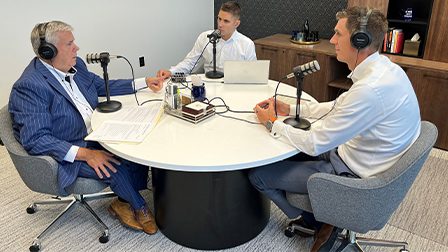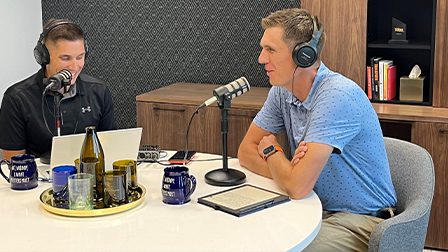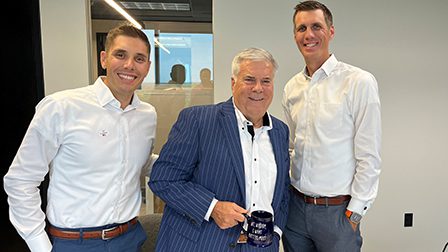Episode Transcript
Episode 13
Debunking social media myths
Kyle:
And welcome to this edition of Wit, Wisdom, and What Matters Most. It’s a podcast by Moneta’s Gast Freeman Troyer Racen Team. My name is Kyle Luetters, an advisor on the team, and I am joined by Danton Troyer, one of the partners.
So, Danton, no guest on this episode, but actually when we’ve been prepping for what is now season two, that’s hard to believe, we were talking about some of the shows that we wanted to do and some of the guests that we wanted to have. And this show really kind of came up as an idea from something we were talking about in passing, which is just financial myths or financial topics that come up on social media, and really wanting to dive into some of these things. Because, as you very well know, in this industry, it is very, very difficult to paint with a broad brush and to paint in absolutes.
Danton:
Yeah, I think that’s, you hit the nail on the head there. I mean, and social media is obviously not a great place for these types of conversations because they’re very nuanced and very individual. But nonetheless, I can’t tell you how many times a year I get financial advice forwarded from an Instagram clip or some sort of social media presence, and it’s a guru who can solve all your problems just through social media posts. So it’s definitely a topic that’s worth exploring.
Kyle:
I can debunk one without much talking, it’s somehow, someway, somebody pays taxes. It’s like watching the movie National Treasure, where the Harvey Keitel character comes in and he goes, Ben, somebody’s got to go to jail. So we can just debunk that one right off the word go.
But you know, there are different things, different mitigation strategies, but really let’s do this. Let’s kind of have you set this up, and we’ve picked out a couple of them that we’re going to kind of talk through. And we’re going to go banter back and forth on these.
But before we get started, do you have anything else that you wanted to add before we kind of jump into that first myth?
Danton:
No, let’s jump right in.
Kyle:
Okay, go ahead for it.
Danton:
All right. So the first one we’re going to talk about is a strategy called infinite banking. And just broad picture, we’ll dive into more of the details as we talk through this, but it’s using a life insurance policy with a cash value, typically. We see this with a whole life policy. And so the thought here is, why do I need a bank when I can use this as my savings account and just borrow money from the cash value or the insurance company, paying myself interest?
Everything sounds great. I don’t have to pay the bank any interest, I’m paying myself, that sounds reasonable. I’m using the money that I put in and so everything, you know, kind of checks a box that is this easy solution to bank yourself and who needs the big bad banks?
Kyle:
I think, and I hear what you’re saying there, what’s the oldest profession in the world? Sales and persuasion. And I think that’s key in taking a look at a lot of these.
So let’s take this one and go through it just a bit. So you’re going to have a permanent life insurance policy that is going to build cash value. So permanent life insurance policy, as long as the premiums are paid, stays in force over the course of your entire lifetime.
And different from term insurance, whole life insurance builds cash value. Now that’s what you are, in a sense, borrowing against or paying yourself on is the cash value in that policy. First and foremost, whole life insurance is a whole lot more expensive. I think that’s where they get the name – whole is a whole lot more expensive than term insurance. And rightfully so, you are building a cash value. They are doing a calculation based on you keeping this coverage in place over the course of your entire lifetime.
But you’re paying somewhere between 15 to 20 times the cost for that permanent life insurance policy. So I think if you’re going to make this case for having this bank of your own, you have to factor in the cost of insurance, because that’s a very big key in all of this. And that’s where some of the higher costs do come from.
Now there are a ton, and I mean a ton of different types of policies out there, the way the policies are structured. And be very clear when I say this, I do believe there is a case for these types of products in certain scenarios. And again, each individual scenario is individualized.
But by and large, these things are expensive policies. They kind of fit a narrow gap for folks. And the costs are just astronomically high between, the cost of insurance, the cost of riders that are honestly associated with them, and they have a slower growth rate than what you would at other normal investments. So you know, in a lot of cases I’ve seen in-force illustrations where permanent policies don’t really go cash flow positive until about year 14 or 15.
Danton:
I think that’s exactly a couple of the main points that are maybe intentionally left out of that sales pitch is a lot of people see this as kind of a silver bullet that can work right away. And as you said, this is very narrow on when it actually can work partially, I mean, that’s part of the issue. And then you do have the higher costs associated with just insurance in general, which it makes sense you’re paying for that death benefit.
So for it to work, there’s got to be a lot of things that line up perfectly for you. But I think the other caveat is too, those things have to be lined up for a long period of time. This is not something that just you snap your fingers and you’re taking loans to pay for your kids’ college the next year.
It’s not the way it works.
Kyle:
You have to have built up enough cash value in the policy in order to loan against it. And typically, in the first few years, cash value growth is very slow unless you structure it in a certain way. And again, these are very complex products, and I do say that word products, Danton, emphatically, they are complex products. And it may take a while before the cash values get to a point where they could really be a good source of lending. That’s why if you’re older and you’re listening to this and you do have a policy that’s been around for 20 or 30 years and has accumulated a lot of cash value, this might make sense.
But think about that a second. It’s going to take 20 to 30 years for you to, quote unquote, build your bank. Why not go ahead and just borrow from a regular institution?
Because there is another thing, because I know something I will get from other folks is, well, they’ll say, well, you know, you could front load a whole life policy. As Lee Corso, said, not so fast, my friend. There is something called the Modified Endowment Contract.
And if you stuff too much money into the policy from the word go and then think you can borrow against it, you might actually turn this thing into a taxable time bomb that is going to strip away a lot of the tax-deferred or tax-free benefits of a life insurance policy. And again, you have to ask yourself in these deals, in any one of these types of social media financial topics, who benefits the most? Who benefits the most from doing this?
And insurance products, like the whole life policies, have very high commission rates. Now, again, I’m not necessarily saying that that is the case for everybody, but it’s another question to ask as you’re taking a look at potentially employing the strategy.
Danton:
Yeah. And it’s going through, as you said, just the full picture of it. And then the other side is, what’s the opportunity cost out there?
This isn’t the only strategy or way of running your personal finances. So I think that’s part of it too, is there’s definitely an opportunity cost by doing it in a specific way. And it’s just not flexible is the other part with this. I mean, once you’re in, you’re kind of in, so if your life changes, if the world changes, it’s pretty difficult to unravel as versus a bank. I mean, yeah, you may or may not need to pay off that loan right away, but that’s the same thing with this life insurance policy. Plus, you’re potentially going to get hit with a big tax bill too, if you don’t do it appropriately. So you could get hit maybe twice as hard on the backside if you’re not doing it the right way.
Kyle:
You know, one thing in working with a lot of families that I do see on these policies, and then that this was a personal story from someone that I knew very closely, is that when you’re young, cashflow is still a major concern you’re trying to build. You need life insurance coverage, but if someone comes along and says, hey, you know, do this permanent policy, it’s 15 to 20 times more expensive than a term policy, and you get into a tight spell where you’re trying to pay the mortgage, pay groceries, keep shoes on the kids, so to speak, you probably are sitting there going, you know what, this month it’s down between the life insurance premium and Hamburger Helper. And I can guarantee you which one falls by the wayside.
Danton:
Yeah, yeah, I mean, it’s tough because when you need the most life insurance, you’re probably younger and you’ll have less assets to make up that gap. And so something like this might sound appealing, especially before you have kids and maybe your cashflow is feeling pretty good for that short period of time before you to have a couple kids, and that’ll take that away. But that illustrates a point. There’s just life cycles and life changes you go through, and to think that everything’s kind of straight line going to be just better than it was the day before, unfortunately, isn’t always the case. We do have setbacks. I mean, it’s just, it’s life. And these products if you don’t pay the premium, they don’t care.
So, there’s just more flexibility and you may be able to maybe try something different if the bank loan system isn’t working for you. Hopefully, you start saving money. There’s just so many different ways to do this that are more flexible.
Kyle:
And you and I have been doing this now long enough, Danton, I think you would agree with this, in our profession and in what we do, what we’re always trying to find for folks is how many options they can have by controlling their cashflow and giving them the ability to conform their financial plan to updated goals, updated dreams, updated desires over the course of their life.
And again, when we see this being done or propagated, so to speak, it’s usually to a younger crowd. And that’s why we’re kind of beating up on the younger folks here anyways. Again, if you’re older and you’ve had a policy for 20 to 30 years, you’ve built up a decent amount of cash value, there’s not a lot that’s going to be probably changing in your picture. Probably could make sense, I wouldn’t necessarily utilize it all the time. I’ve seen them blow up on retirees from time to time, especially when they get involved in buying other risk assets or buying real estate with some of these dollars.
So just something to keep in mind there. But again, there’s a lot of nuance here, but what we wanted to do was really kind of paint the picture on this one as we wrap it up. It’s not as plug and play, nor is it as immediate as what you might see on an Instagram or YouTube or something like that.
Danton:
Yeah. That’s a great summary.
Kyle:
So another myth that we wanted to talk about here is that the stock market is just gambling. So again, if you could picture it, Danton and I rolling into the casinos out in Vegas, we’re putting it all on black, maybe he’s a red guy, and that’s really how this is going. And to a degree, maybe there is some element of that. I don’t know for sure, depending upon what you see in the headlines and what the markets do and react, one can be led to believe that.
However, I think to just paint with a broad brush, saying that it’s gambling, like in its purest sense, is not truly accurate because of all the information that goes behind it.
Danton:
Yeah, there’s definitely similarities, if you will. I was a nerd and was watching, I think it was a PBS special on the Monte Carlo simulations and we use that a lot in ours. I was interested to find out they do use it in gambling and they do use it in predicting the weather. So to say there’s no correlation is obviously not correct. And I think if I had to say one thing about it, day-to-day, yeah, there’s a lot of gambling.
I mean, the odds are closer to 50/50 on if you’re going to have a positive day or a down day in the stock market. But once you start to add time to that equation, you’re going to come out ahead. With gambling when you start to add time to that equation, you’re not going to come out ahead.
So I think that’s the biggest difference. We as financial advisors, we’re not trying to speculate on the day-to-day, because we just know that that is closer to gambling. But if we take this long-term approach, statistically speaking, we’re going to win.
It’s not to say it’s bulletproof, just like anything else. So, I think that’s where it draws the comparisons to gambling, but obviously there’s a lot of difference there as well.
Kyle:
There really is. And I think this is where asset allocation and diversification come into play as well, too. If you think about it, when you go and you gamble, unless you’re really getting into sports betting and like parlays and stuff like this and that, let’s just take blackjack for instance. You are going and playing basically against the dealer, okay?
Asset diversification is that you’re putting a little bit of money everywhere. I mean, that might be, I am not an expert on things like craps or parlay bets or anything like this or that.
Maybe you do put a little money everywhere. But again, that’s some diversification. But there’s at least some data that is helping to back up what you’re doing with your investing.
You’re investing in an economy that is hopefully growing. I always loved the picture of what our economy is, is if you look out the window and you see cars driving around and you see delivery trucks, and you see construction workers, and all of this and that, you don’t really have that with gambling.
At least in sports betting, you’re just really dependent upon sports officiating, which is a field I would not want to be in these days. I definitely would not want to be an umpire or an official at this point. There’s so much writing on this.
But I think it’s really true that risk can be managed inside of a portfolio and inside of a financial picture. It can’t really be managed, in my opinion, at the blackjack table unless you’re going to be overly conservative or overly aggressive or the same thing too. You and I can’t…if we put some money on the Chiefs, we’re not hopping into uniforms and going out there and making sure, but we can do some research and so on and so forth there.
But I really think that there might be some elements of gambling to it, but I would say that it’s much more informed, much more of a longer-term picture with all of this stuff.
Danton:
I think the bottom line is the odds are statistically in your favor to be investing. And if you think about the reason behind that, you’re basically investing in a company. The company wants to do good. I mean, you know, they want profit.
Kyle:
It’s not adversarial.
Danton:
Yeah, it’s not like when you’re at the table playing blackjack, they do not want you to win. And in fact, they will comp you to stay there longer because they know if they can get you to stay longer, you’re probably going to lose eventually. So it’s just, yeah, to your point, I think adversarial is the correct way to look at it.
You’re in theory on the same side of the table when you’re investing with a company. Where at the casino, you’re trying to take money from them and they’re trying to keep their money.
Kyle:
Exactly, exactly. So I think that’s a good place to be on that one.
Kind of the last one that I want to wrap up with today, and the funny thing about this is we came up with a lot of these. Maybe it’s an indictment on how much social media we are ingesting on this topic. But one that I wanted to talk about, we see this one probably the most in real life out of the three myths.
Danton:
For sure.
Kyle:
And that is the idea of passive real estate investing. And the pitch here is just, hey, go buy a few rental properties, sit back, and watch the checks roll on in.
One of the partners here calls it mailbox money. And that’s in theory, a nice idea. But in practice, it’s not always the case, is it?
Danton:
No, of course not.
And everyone thinks real estate, and there are some very positive things of why you should be invested in real estate, but when you take it to the extreme, which is social media in general, of you should only be invested in real estate and every dollar you need, and it’s the easiest thing in the world, that’s when you start to have maybe some of the myths start to creep in with it. It’s certainly not easy.
And I think the biggest thing that is maybe under told about real estate is, versus just investing in stocks, for example, you can lose more than you put in on real estate.
Kyle:
You’ve always said this.
Danton:
Yes. Yeah. I mean, if you put $10,000 in the stock market and you just pick a bad company, they go out of business, you lost 10 grand.
You buy a house, you get a mortgage, you put $10,000 into it. The bank’s going to want their money. Your renters who trash the house, they don’t care.
You’re going to have to put money into the house to get it fixed up. So that 10 grand not only is out of your pocket, but you need to put more money back into that real estate property just so you can get back to hopefully even at that point.
Kyle:
There is one correlation I would make with real estate investing and regular investing, and that’s when you introduce margin in short selling. That’s when, back to your point, if you buy $10,000 worth of a stock and it goes to zero, you’re out the $10,000. If you start writing options and short selling stocks against those positions, you in theory can owe a lot more and lose a lot more.
That’s the same way that I would look at real estate as well, too. And again, there’s a hassle factor with real estate. If you own a house, you already know that real estate is a hassle if you own a personal residence.
And then imagine transferring that similar type of a headache to properties that you own that you don’t live in and that you don’t maybe have as much of an attachment to. And by the way, you also have folks potentially occupying, whether it’s commercial or residential or industrial, they don’t care as much as you do. That’s a dirty little secret, but they don’t care as much as you do.
That’s also another thing too, like we, in many cases, we’ll tell folks if they move on to not rent out a home that used to be their primary residence for the very reason you’re going to show up a couple, two or three years later, look around and go, oh my God, what did you do?
Danton:
We did that exact thing. We rented out our first house. I didn’t lose. Well, I did. If I had a spreadsheet to put all together, but we stayed at it long enough to where we might’ve broke even, but from an opportunity cost, we definitely lost money on the deal.
But yeah, my wife couldn’t go back to the house. After the first tenants moved in, she was like, you have to go. I cannot see it like that. And they did leave it and they did destroy it and they did not pay rent and I was out of a good amount of money.
And when I first went up there, I had a full-time job and now I basically had to take off work for a week to go clean up this place. And we rented the dumpster, the whole nine yards. And I was sending her pictures, she’s like, I’m so glad I didn’t come with you cause I probably would be crying right now if I had to see it like this. And you know, it was hard. It was our first house.We spent a bunch of time and money fixing up the way we wanted it and we thought it was very nice. And obviously when they moved in, they thought it was nice cause they wanted to live there as well. But at some point, that disconnect – to your point – was they can leave whenever they want with no recourse, basically. So what’s the incentive for them to take care of it?
Kyle:
Yeah. And again, like that upfront cost, whether you’re putting cash into it or if you’re borrowing a lot. So if we can drive this back to the very beginning of the conversation, talking about borrowing, you might be borrowing a lot of money from various entities, banks, credit unions..you might have investors that you’re answering to; it gets to be very stressful and it gets to be so stressful, in some cases, that folks kind of panic about it, especially when interest rates hiccup one way or the other, or they lose a tenant. A lot of the folks, if you really do a deep dive into real estate investing actually really, really are, are a big fans of 100 percent cashflow because once you can get a cashflow or once you get a property paid for, and you can cashflow the next one, cashflow the next one, you’re getting those full dollars coming in. Then you can really start to take a look at the return and go, wow, this is great.
Until then…we’ve done a number of scenarios where we’ve taken a look at cap rates for our clients when they come in and say, I kept this property and it’s doing really, really well. But then when you run the actual numbers through a spreadsheet impartially, you realize that you maybe actually could do better with a professionally-managed fund than you could do with the actual property.
And guess what, Danton? You don’t have the hassle of dealing with a water leak or someone clogging a toilet at 2:00 in the morning, or the heater going out, or the parking lot coming apart if you have a commercial building. And also, too, people that don’t pay. You don’t have to deal with that either.
So those are some things to consider. And again, these are not necessarily all things that should just make you run for the doors with this; there are legitimate folks that just love this. And if you love it and you’re willing to sign up for all of these things, have at it, go for it. I mean, if that’s what you love doing, go for it.
Danton:
Yeah, I think the myth of this is that it is a kind of, to your point, go to the mailbox and collect your money type of situation. I think any serious real estate investor 100% will tell you that that’s not the case. There’s going to be a lot of work in this and there’s going to be a lot of work along the way, as well that you’re not going to be just mailing…Even with a property management company, that it’s the same story. Then still you have to get to the point where you’re scaled enough to make those dollars. And it’s not a get rich quick scheme, like a lot of people think it’s going to be.
Kyle:
Yeah, my funny thing, too, is just watching these things and talking about how hey, in two to three years we built this real estate empire.
And, you know, when we go back to the first one, you know, who benefits from this is if we’re doing so good at real estate and why are we like sharing our secrets? You know, that’s just the cynic in me, maybe just a little bit, and I get that. But at the same token, too, in any one of these things, in any marketing, you have to figure out, okay, who’s benefiting at the end of this. And that doesn’t necessarily have to always be a negative thing, by the way. You know, there’s always services we need. I’m glad that there is a company out there that is marketing their plumbing services when I need something done. Or, you know, we had someone come by and take a look at the roof on our house the other day. He had a lot better shoes to be climbing up there than I did. I’ll just tell you that he did not look like he was getting ready to fall off; I did.
And so, you have to market and you have to ask the question, who’s ultimately going to benefit from this? And that’s where I’m a little suspicious, if you will, in some of these instances.
And also, too, there’s an entire area of this that we could jump into about tax code and tax loopholes. I think there is a lot of misinformation when it comes to this out there. We’re not really going to dive into that because it is very nuanced and delicate. But again, going back up to the top of the show, somebody somewhere is going to pay the taxes. Somebody somewhere is going to have to go to jail. And again, I make that as a joke, if you’ve watched the National Treasure movies, but, you there is going to come a time where that is taken care of there.
Danton:
Yeah, and that’s what we said from the beginning. All of these are rooted in truth in some way.
So that’s a hard part with these and why it’s so hard to discern: does this make sense for me? is basically what it comes down to. So when we say myth, part of it is, yeah, there’s some truth to this, but if you put it all together, it’s not quite exactly as it may seem, especially in a 30-second social media clip.
Kyle:
I think also, too, when we say myth, the myth being that these scenarios or these lines of thought apply 100% of the time. I think that is probably the biggest thing, because in a given scenario, I know we talked about the stock market being gambling, some people may view it that way and that may be their MO, that’s fine. Same thing with the infinite banking, as well as the mailbox money.
It’s just very, very difficult with personal finance. And I’ll say that again slowly – personal finance – to say that certain things work or a certain thought pattern works or applies 100% of the time.
Danton:
Correct. And I think as an individual going to social media and then taking that and running with it and applying and going down that rabbit hole is where we see it just be very dangerous for someone’s personal financial picture, they took that and ran with it sometimes too far.
Kyle:
Yeah, and so what I would always just lament to you, too, is if you’re ever finding yourself taking a look at this, find someone you trust and just, hey, what do you think about this? There are certain people in our lives that we know that we can go to to discern through some of these things.
If you’re ever considering something like this, something that you do see, find someone that you trust and just run it by them and have that impartial party look at both sides and go, hey, you know, based on what I know, maybe this makes sense. Maybe it doesn’t.
Danton:
Yeah, and I think letting somebody that knows you personally from a personality standpoint, and then also, if we’re talking about finances, someone who knows you from a financial standpoint, so they can at least help you know, am I mentally equipped to take this on and also am I financially equipped to take this on? Because the guy on Instagram has no idea, anything about you.
Kyle:
Nope, nope, nope, nope, does not, does not. So, uh, Danton, this was actually a lot of fun. I think we’ve laughed and chuckled a bit. And I hope that everybody that hears this understands that we’re not necessarily saying these are all wrong. What we are saying is peer under the hood a little bit more and see if it really applies in your situation. Maybe if all of it doesn’t apply, maybe does some of it apply, and really have an honest conversation with yourself before you head down some of these paths.
Yep, alrighty folks. Well, Wit, Wisdom, and What Matters Most is produced by Moneta’s Gast Freeman Troyer Racen team, headquartered in St. Louis, Missouri.
Until next time, enjoy what matters most.




© 2025 Advisory services offered by Moneta Group Investment Advisors, LLC, 100 South Brentwood Blvd., St. Louis, MO 63105 (“MGIA”), an investment adviser registered with the Securities and Exchange Commission (“SEC”). MGIA is a wholly owned subsidiary of Moneta Group, LLC. Registration as an investment adviser does not imply a certain level of skill or training. This is an advertisement. The information contained herein is for informational purposes only, is not intended to be comprehensive or exclusive, and is based on materials deemed reliable, but the accuracy of which has not been verified. Examples contained herein are for illustrative purposes only based on generic assumptions. Given the dynamic nature of the subject matter and the environment in which this communication was written, the information contained herein is subject to change. This is not an offer to sell or buy securities, nor does it represent any specific recommendation. You should consult with an appropriately credentialed professional before making any financial, investment, tax, or legal decision. Past performance is not indicative of future returns. You cannot invest directly in an index. All investments are subject to a risk of loss. Diversification and strategic asset allocation do not assure profit or protect against loss in declining markets. These materials do not take into consideration your personal circumstances, financial or otherwise. Trademarks and copyrights of materials linked herein are the property of their respective owners.



